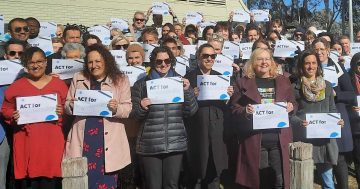
Hiding in plain sight: homelessness is all around us in the capital, even if we try not to see it. Photo: Ian Bushnell.
In a city full of politics, one of the ACT’s great political mysteries is why the ACT Government’s practical support for people experiencing poverty has gone backwards over more than a decade.
How could this happen with such a progressive electorate, with governments that have been elected on their progressive promises over the last quarter century?
Perhaps the answer lies in the negotiations to form a government, which are doubtless again underway after the recent election. These negotiations might be the missing clue needed to solve the mystery because they do so much to set the government’s agenda but often lack transparency. Typically, the majority of a government’s agenda over four years is set in just a few weeks of negotiations.
Whenever power is being exercised with little public oversight, there is always a risk that people at the margins will be forgotten and further excluded.
Two of the most important policy levers the ACT Government has to assist people experiencing poverty are public housing and funding for the community sector, which delivers essential services to this population. When a new government is formed, these two areas will be ones to examine closely to see if the new government is prepared to stop the decline in support for people doing it toughest.
The results of the decline in public housing are obvious at most Canberra shops as homeless people seek shelter. The proportion of public housing in Canberra fell from 12.2 per cent in 1989 when the ACT was granted self-government, to just 5.7 per cent in 2024.
In practical terms, much of the public housing stock was sold off, and waiting lists have ballooned. The average wait time for someone in the highest level of priority, such as a woman fleeing domestic violence, is now six months.
Last week, ACTCOSS released research that showed that funding for the community sector as a proportion of the ACT Government’s overall budget declined 30 per cent between 2009-10 and 2022-23. While the community sector delivers a range of essential services, from mental health services to emergency food relief to rape crisis response, funding for the entire community sector now accounts for just 2.5 per cent of the ACT Government’s budget.
This decline in funding happened while population growth was substantial – increasing 29 per cent between 2010 and 2023. After adjusting for inflation, funding for the community sector increased by only 15 per cent, about half of population growth.
Most new investments were for new programs rather than to expand existing programs to help more clients. Over the same period, overall ACT Government expenditure increased by 65 per cent after adjusting for inflation, or more than four times the increase in community sector funding. These funding decisions have real-life consequences, as community organisations need to turn away people in crisis because of a lack of resources.
The declines in public housing availability and funding for the community sector make each other worse. When a person is not securely housed, they need more services, not fewer. They also need more intensive services because secure housing is the strongest foundation for other supports.
The solutions to these problems are clear. They include a transformative uplift in investment in social housing. Social housing should account for 10 per cent of all dwellings in Canberra by 2036. Future funding for the community sector should be pegged to population growth, with an automatic Population Level Adjustment written into contracts. The government should also invest in a catch-up fund to account for past population growth. To enable the best outcomes for Canberrans, government should ensure that all aspects of community sector work are supported, from staffing to climate adaptation to appropriate premises.
Anyone who believes in a fair go for all Canberrans, and any voter who wants to see if the government is serious about its progressive credentials, should watch these spaces closely. They might just solve the mystery.
Dr Devin Bowles is the CEO of ACTCOSS. He has held leadership positions in government and the non-profit sector, and worked as an academic in epidemiology and public health.





















